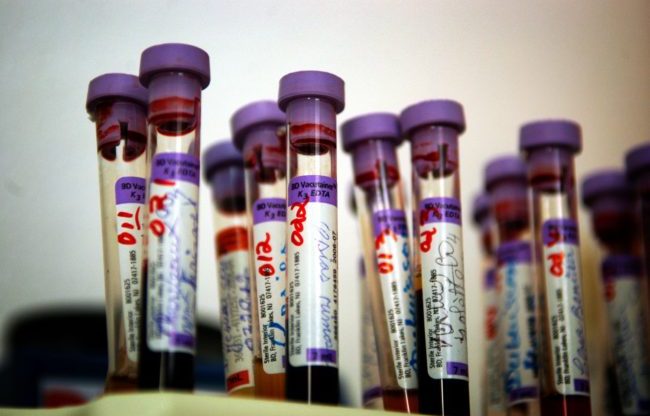Terrence Higgins Trust gives away thousands of HIV home testing kits

HIV testing should become part of routine healthcare, the HIV Commission says. (Getty)
A charity is offering thousands of HIV home testing kits for free.
Terrence Higgins Trust, the HIV and sexual health charity, is giving away 2,000 kits in a bid to reduce the number of Brits who are unaware of their status.
The charity reports that one in seven people who are HIV-positive do not know their status.

Gay and bisexual men, along with black African men and women, are the most-likely to be affectived by HIV.
The home-testing kits can identify a person’s results in just 60 seconds, as unlike postal testing you do not need to send your sample away.
RELATED: Scientists recently cured HIV in living animals for the first time.
Seven volunteers for the charity have shared videos of themselves using the bioLytical INSTI HIV self test kit, which is said to be the world’s fastest.
Imraan Sathar, a company director from London who took the test, said: “A lot of sexual health clinics are only open during working hours in the week, and weekends are always super busy.
“The option to have an HIV testing kit delivered to me and producing a result almost immediately is infinitely more convenient for me.
“I think the self-test giveaway is a great idea, and so I wanted to share my video to show people that there’s now a really straightforward way to find out your HIV status.”
Dr Michael Brady, Medical Director at Terrence Higgins Trust, said: “Today, these individuals have led the way by showing just how quick and easy it is to test yourself for HIV.
“We’re really excited to give two thousand more people the opportunity to take an HIV test in their own homes.
“We hope these videos will inspire many others to order a free self-test while they’re available, particularly people who might not have time to go into a clinic or who do not want to wait for a result.”
RELATED: Prince Harry and Rihanna take an HIV test.
Dr Brady added: “One in seven people with HIV do not know they have it. It’s never a good idea to be unsure of your HIV status.
“Testing puts you in control and if you do get a positive result, treatment today means you can live a long and healthy life, and will stop you from passing the virus onto others.”
The expected age at death of a 20-year-old patient starting antiretroviral therapy (ART) between 2008 and 2010 before the disease had fully taken hold was 78 years old.
Life expectancy in the US is 78.9 in the US and 80.1 in the UK.

The 17-year government-funded study published today in The Lancet was conducted on more than 88,000 people over the age of 16.
It showed that between 1996 and 2010, life expectancy in 20-year-old patients beginning ART increased by about 9 years in women and 10 years in men.
You can find more information on the home testing kits here.

